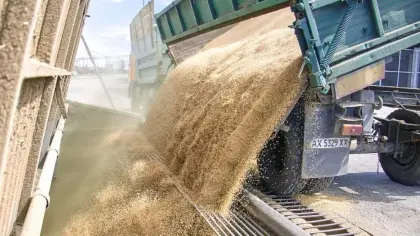Russia is threatening to use food as a weapon, in addition to energy blackmail, with President Putin accusing the European Union of deception over a recent deal to permit the export of grain from Ukrainian ports which Russia has blockaded through its invasion.
Speaking on September 7 at the Eastern Economic Forum in Vladivostok, Putin stated that the export of grain from Ukrainian ports, unblocked due to a deal brokered in July with the UN and Turkey, should be restricted. He promised to discuss the issue with Turkish President Recep Tayyip Erdogan.
JOIN US ON TELEGRAM
Follow our coverage of the war on the @Kyivpost_official.
“We did everything to ensure that Ukrainian grain was exported, and the result: all grain is sent not to developing countries, but EU countries. Only two ships out of 87 were loaded to the neediest countries,” he said.
After the conclusion of the grain agreement on the export of Ukrainian grain, world food prices fell to their previous levels last month, which is why the threat of famine in poor countries receded.
The same threat was echoed on September 6 by the Russian Permanent Representative to the UN, Vasily Nebenzya. He threatened not to renew the grain agreement if Russia’s demands are not met. Nebenzya claimed that the export of Russian food and fertilizers under this agreement had not yet begun.
“The deal is concluded for four months. That is, it ends in November. Under normal situations the transaction should be extended. We want to see the implementation of the Russian part of the agreement. This has not happened yet,” Nebenzya said.

N. Korean Troops Massed in Russia to Enter Ukraine War ’Soon’: Pentagon Chief
And he added that he “does not exclude anything” since the Russian Federation “does not see” the implementation of the Russian part of the agreement.
However, since the start of Russia’s full-scale invasion of Ukraine, it has been exporting goods to the U.S. to the value of at least $1 billion a month, according to an investigation by Associated Press. Exports include fertilizers, the demand for which has grown.
The agreements concluded by Ukraine and Russia on July 22 to establish grain corridors in the Black Sea are valid for just 120 days. Prior to this, some ships found themselves in ports occupied by Russian invasion forces while ships in Odesa were unable to leave the port with their grain cargo.
You can also highlight the text and press Ctrl + Enter






